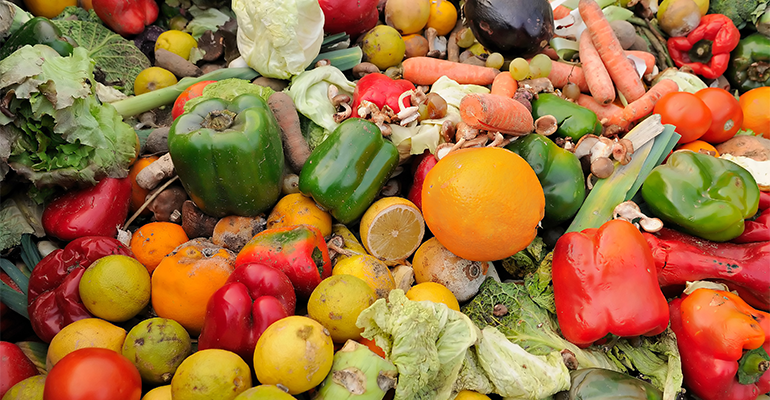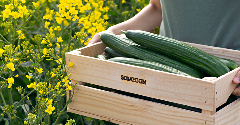News
Exploring the business benefits of food waste reduction
10 Aug 2022
The environmental and human cost of food waste make reduction strategies “one of the most urgent and daunting” challenges to society, but businesses can use the fight on waste to drive additional revenues and profit, according to a report.
More than 800 million people are undernourished, with approximately 45% of deaths among children under five years linked to poor nutrition, found the report, published by the Capgemini Research Institute, an internal think-tank at global consulting firm Capgemini.

Yet 2.5 billion tons of food is wasted every year – with an estimated 1.2 billion tons of food lost on farms and nearly 930 million tons wasted in retail and at the consumer end.
Preventing or recovering just 50% of that food waste could end world hunger, the report concluded.
“Resources deployed to produce, process, transport, and dispose of food likewise generate a huge amount of waste and expense,” it read. “Coupled with raging food-price inflation and persistently high energy prices (raising the cost of transporting goods), food loss and waste constitute one of the most urgent and daunting challenges to our society.”
However, Capgemini suggested that it was “not all doom and gloom”, adding that transforming global food systems to reduce food waste does not have to be bad for business. In fact, given that the financial cost of food waste is estimated to be $1 trillion, such transformations could present a significant opportunity for food producers across the supply chain, the company claimed.
The business benefit of reducing food waste
“Organisations can tap into this negative cash mountain to lower costs, enhance sustainability, and capitalise on new revenue-generating opportunities emerging from the redistribution of surplus food,” the report read.
“Our research finds a strong connection between food waste-related initiatives and business benefits, including cost savings, increased revenue, new revenue streams, better ESG ratings, as well as higher consumer confidence.”
It also cited a 2017 study of 700 food manufacturing, retail, and service companies by sustainability coalition Champions 12.3 which found that half of all organisations that invested in measures to reduce food waste saw a 14-fold or greater return on their investments.
The Capgemini research also found a strong association between food waste-related initiatives and business benefits, with more than half (56%) of companies citing reduction in costs as a top benefit from such initiatives.
“Through its Eden technology solution, Walmart, for instance, is projecting that it will save $2bn over five years by improving the quality and flow of fresh groceries from farm to shelf,” the report read.
Meanwhile, a case study from Wasteless – a company specialising in dynamic pricing to reduce food waste and increase perishable food profit – showed how an Italian retailer reported a waste reduction of 39% and a revenue increase of 110% for a set of products in its poultry category after implementing the dynamic pricing system.
The Capgemini report also cited innovations by Unilever’s Cremissimo ice cream team, which has developed a process to “rescue” unused ice cream and mix it with other high-quality ingredients to create new products. In fact, it notes that the Cremissimo Chocolate Hero – which had sold more than 1.2 million tubs as of February 2021 – is made from up to 40% “would-be-wasted” ice cream, representing a waste reduction of 160 tons (300,000 tubs) of ice cream a year.
Failure to scale is a significant risk
However, while most food companies say they are focusing on their own food waste reduction initiatives, very few are actively working with their supply chains to fight waste at other stages, including agriculture, storage, and distribution, the report noted.
“A majority (77%) of organisations in our research say they have committed to UN SDG [sustainable development goal] 12.3, which focuses on halving per-capita food waste at retail and consumer levels and reducing food losses along production and supply chains, including post-harvest losses, by 2030,” the report read. “However, only 15% of organisations have achieved (or are on track to achieve) their targets.”
Related news

Soy story: WWF scores UK supermarkets on sustainability efforts
12 Nov 2025
WWF has published its latest “Soy Scorecard”, ranking UK supermarkets’ efforts to combat deforestation and land conversion in their soy supply chains.
Read more
Standing Ovation and Bel scale up casein production from dairy co-products
11 Nov 2025
Foodtech company Standing Ovation has partnered with cheese specialist Bel Group to manufacture dairy serums for industrial-scale casein production via precision fermentation.
Read more
New UPF standard hoped to offer consumers ‘coherence and clarity’
10 Nov 2025
Ingredients companies are being urged to enter “a new era of partnership and innovation” following the launch of the industry’s first non-UPF verification scheme.
Read more
Whistleblowers accuse UK meat industry of promoting cheap, unsustainable supply
7 Nov 2025
An anonymous group of industry insiders has accused the UK’s biggest food companies of systematically driving down meat quality and welfare standards.
Read more
Bord Bia presents Irish dairy ingredient suppliers at Fi Europe
6 Nov 2025
Dairygold Co-operative Society, The Carbery Group, and Ornua Co-operative: Meet with sustainable producers of Irish dairy ingredients at Food ingredients Europe 2025, Hall 7.2 Stand M18.
Read more
AI attraction means foodtech startups must ‘prove’ rather than ‘promise’
4 Nov 2025
Reports suggest that artificial intelligence (AI) is sucking investment from foodtech and agritech, but investors say the picture is complicated.
Read more
Penguin and Club bars no longer classed as chocolate
30 Oct 2025
Penguin and Club bars can no longer be classified as chocolate after the pladis-owned McVitie’s brands turned to cheaper alternatives amid the ongoing cocoa crisis.
Read more
Could plant-based protection replace plastic packaging?
29 Oct 2025
Swedish foodtech company Saveggy has launched an additive-free plant-based protection for cucumbers, offering a waste-free packaging solution for fruit and vegetables.
Read more
Does promoting protein content push up plant-based sales?
27 Oct 2025
Promoting the protein content of meat-free products is a more effective sales strategy than adding carbon labels, a study of UK bakery chain Greggs suggests.
Read more
Amazon Grocery launch aims to balance quality with affordability
22 Oct 2025
Global e-commerce giant Amazon has introduced a new private-label food brand, combining existing Amazon Fresh and Happy Belly products with new everyday items.
Read more